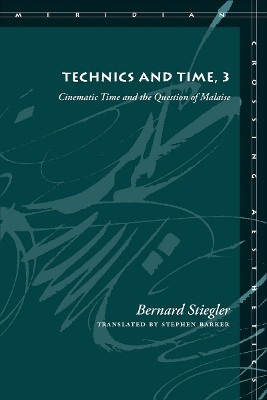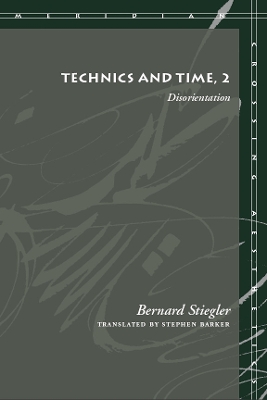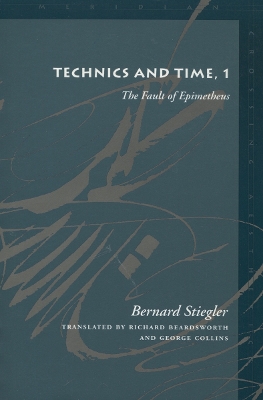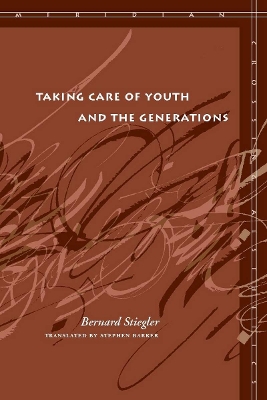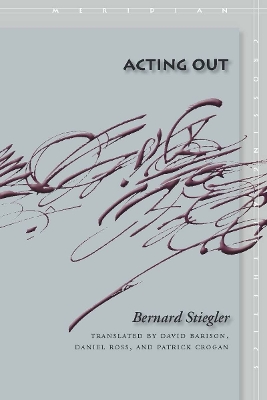Meridian: Crossing Aesthetics
5 total works
In the first two volumes of Technics and Time, Bernard Stiegler worked carefully through Heidegger's and Husserl's relationship to technics and technology. Here, in volume three, he turns his attention to the prolematic relationship to technics he finds in Kant's Critique of Pure Reason, particularly in the two versions of the Transcendental Deduction. Stiegler relates this problematic to the "cinematic nature" of time, which precedes cinema itself but reaches an apotheosis in it as the exteriorization process of schema, through tertiary retentions and their mechanisms. The book focuses on the relationship between these themes and the "culture industry"— as defined by Adorno and Horkheimer—that has supplanted the educational institutions on which genuine cultural participation depends. This displacement, Stiegler says, has produced a malaise from which current global culture suffers. The result is potentially catastrophic.
Disorientation is the first publication in English of the second volume of Technics and Time, in which French philosopher Bernard Stiegler engages in a close dialogue with Husserl, Derrida, and other philosophers who have devoted their energies to technics, such as Heidegger and Simondon.The author's broad intent is to respond to Western philosophy's historical exclusion of technics and techniques from its metaphysical questionings, and in so doing to rescue critical and philosophical thinking. For many years, Stiegler has explored the origins and philosophical, ethical, and political stakes of a global process he calls "the industrial temporalization of consciousness." Here, demonstrating that technology—including alphabetical writing—is memory, he argues that through new technologies of retention and inscription we have come to live in a world where time devours space, a disoriented world in which we have lost our bearings. Immersed in the multimedia of an over-connected world, with time and space as we know them abolished, we no longer find "cardinal points" to guide us and may even be led where we do not wish to go. We must therefore prepare to confront new spheres of ideological control and discover new possibilities in the digital environment.
What is a technical object? At the beginning of Western philosophy, Aristotle contrasted beings formed by nature, which had within themselves a beginning of movement and rest, and man-made objects, which did not have the source of their own production within themselves. This book, the first of three volumes, revises the Aristotelian argument and develops an innovative assessment whereby the technical object can be seen as having an essential, distinct temporality and dynamics of its own.
The Aristotelian concept persisted, in one form or another, until Marx, who conceived of the possibility of an evolution of technics. Lodged between mechanics and biology, a technical entity became a complex of heterogeneous forces. In a parallel development, while industrialization was in the process of overthrowing the contemporary order of knowledge as well as contemporary social organization, technology was acquiring a new place in philosophical questioning. Philosophy was for the first time faced with a world in which technical expansion was so widespread that science was becoming more and more subject to the field of instrumentality, with its ends determined by the imperatives of economic struggle or war, and with its epistemic status changing accordingly. The power that emerged from this new relation was unleashed in the course of the two world wars.
Working his way through the history of the Aristotelian assessment of technics, the author engages the ideas of a wide range of thinkers—Rousseau, Husserl, and Heidegger, the paleo-ontologist Leroi-Gourhan, the anthropologists Vernant and Detienne, the sociologists Weber and Habermas, and the systems analysts Maturana and Varela.
Bernard Stiegler works systematically through the current crisis in education and family relations resulting from the mesmerizing power of marketing technologies. He contends that the greatest threat to social and cultural development is the destruction of young people's ability to pay critical attention to the world around them. This phenomenon, prevalent throughout the first world, is the calculated result of technical industries and their need to capture the attention of the young, making them into a target audience and reversing the relationship between adults and children.
Taking Care exposes the carelessness of these industries and urges the reader to re-enter the "battle for intelligence" against the drive-oriented culture of short-term ("short-circuited") attention characteristic of the negative aspects of the new technologies. Long-term attention, Stiegler shows, produces retentions of cultural memory mandatory for social development—and for the counteracting of ADD and ADHD. Examining the history of education from Plato to the current quagmires in France and the United States, he tracks the notion of critical thinking from its Enlightenment apotheosis to its current eradication. Stiegler is unique in combining the most radical of theoretical constructs—such as "grammatization"—with quite traditional values, values he proposes we re-address in our not-so-brave new world.
Acting Out is the first appearance in English of two short books published by Bernard Stiegler in 2003. In How I Became a Philosopher, he outlines his transformation during a five-year period of incarceration for armed robbery. Isolated from what had been his world, Stiegler began to conduct a kind of experiment in phenomenological research. Inspired by the Greek stoic Epictetus, Stiegler began to read, write, and discover his vocation, eventually studying philosophy in correspondence with Gérard Granel who was an important influence on a number of French philosophers, including Jacques Derrida, who was later Stiegler's teacher.
The second book, To Love, To Love Me, To Love Us, is a powerful distillation of Stiegler's analysis of the contemporary world. He maintains that a growing loss of a sense of individual and collective existence leads to a decreased ability to love oneself, and, by extension, others. This predicament is viewed through a tragic event: in 2002, in Nanterre, France, Richard Durn, a local activist, stormed the city's town hall, shooting and killing eight people. Durn committed suicide the following day. The later publication of Durn's his journal revealed a man struggling with the feeling that he did not exist, for which he tried to compensate by committing an atrocity. For Stiegler, this exemplifies how love of self becomes pathological: a "me" assassinates an "us" with which it cannot identify.
